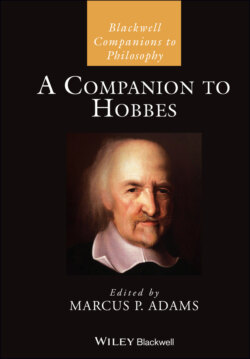Читать книгу A Companion to Hobbes - Группа авторов - Страница 44
3.1 The Hobbesian Philosophy of Mathematics
ОглавлениеThe significance that Hobbes attached to mathematics (and, more particularly, to geometry) is attested by a famous anecdote recorded by his friend John Aubrey. He reports that Hobbes was initiated into the study of mathematics by happening to come across Euclid’s proof of the Pythagorean Theorem (Euclid 1925):
He was … 40 yeares old before he looked upon geometry; which happened accidentally. Being in a gentleman’s library in ___, Euclid’s Elements lay open, and’twas the 47 El. libri. I. He read the proposition. “By G___,” sayd he, “this is impossible!” So he reads the demonstration of it, which referred him back to such a proposition; which proposition he read. That referred him back to another, which he also read. Et sic deinceps, that at last he was convinced of that trueth. This made him in love with geometry.
(Aubrey 1898, 1: 332)
There can be little doubt that this account is embellished,3 but it does comport with some things Hobbes wrote. His Latin Vita reports that in a 1629 journey to the Continent in the company of Sir Gervase Clifton “he began to read Euclid’s Elements; and, well-pleased by its method, not because of the theorems, but rather because of its art of reasoning, he read through it most carefully” (OL I.14). Likewise, the first edition of his Examinatio et emendatio mathematicæ hodiernæ (hereafter Examinatio) contains a passage that closely resembles Aubrey’s account.4 Thus, even if it is unlikely that a chance encounter with Euclid’s statement of the Pythagorean Theorem was literally Hobbes’s first introduction to geometry, there is no doubt that he held the mathematical sciences in high esteem.
What attracted Hobbes to the mathematical “art of reasoning” is the notion that simple and indisputable first principles can lead, by way of rigorous deductions, to important and non-obvious results that are thereby established with demonstrative certainty. He took this as a model for all proper sciences, including the “science of politics,” which he claimed to have founded. There is nothing unique in Hobbes assessment that mathematics provides a model of scientific and philosophical method, but he proposed a philosophy of mathematics that was quite distinctive. In particular, his mathematical ontology rejects the seventeenth century’s received view of the subject and his proposed first principles departed quite significantly from the tradition.
